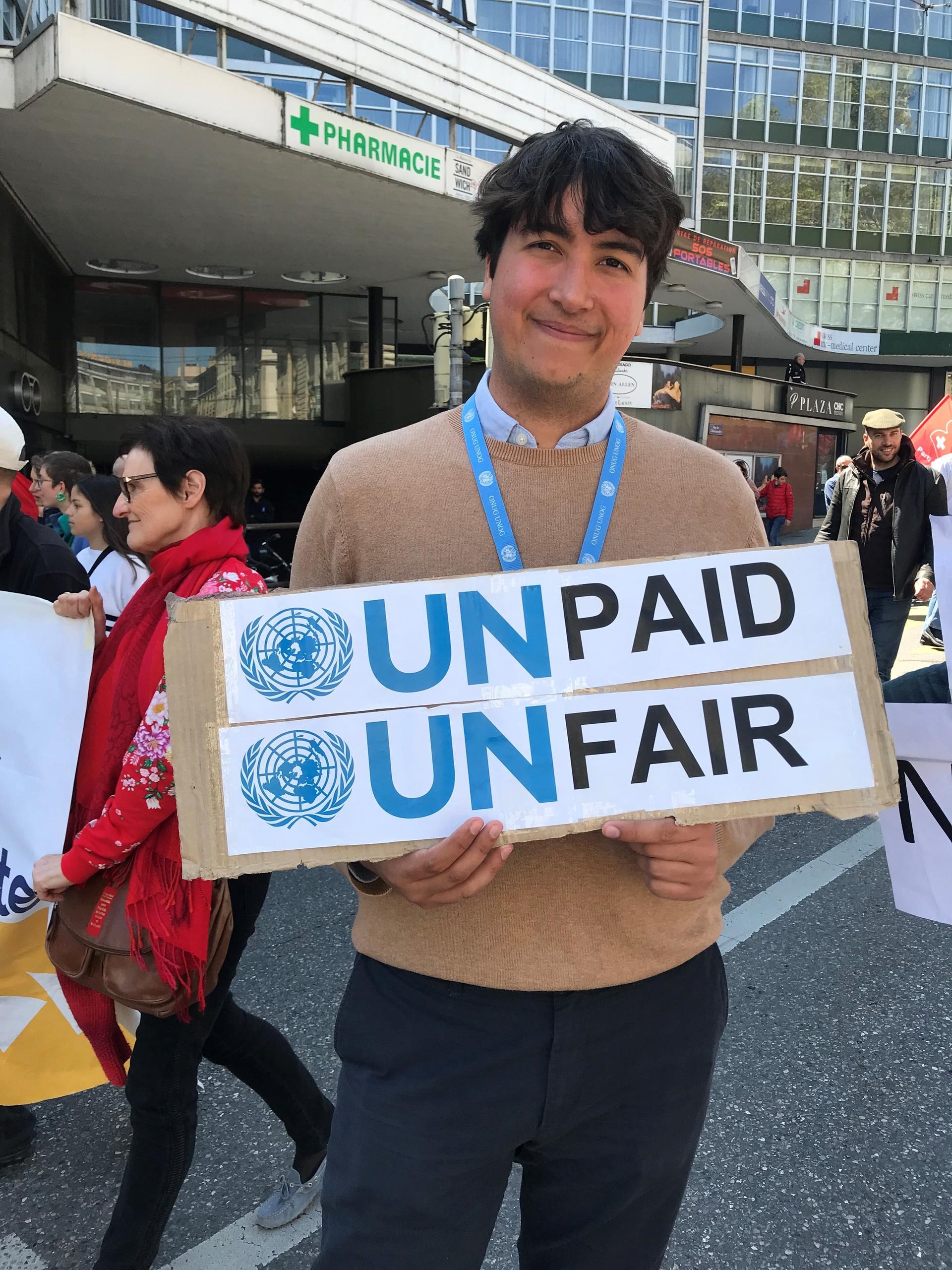
In pricey Geneva, UN interns use May 1 demo to demand pay

Dozens of young interns working at the United Nations and other international organisations in Geneva joined the May 1 demonstration to demand fair and quality paid internships.
They denounced unpaid work placements in the UN system and in other international organisations as “a form of discrimination against those who cannot afford to work for free.” The interns want equal access to fundamental labour rights.
There are an estimated 2,500 UN interns working in Geneva, one of the most expensive cities in the world; around 80% of UN internships are unpaid, according to the Fair Internship Initiative (FII)External link.
“Unpaid internships are wrong on so many levels,” declared FII spokesperson Albert Barseghyan, who helped carry a “Pay Your Interns” banner through the Geneva streets.
“People are working and not getting paid,” he noted. “Others who cannot afford to work for free are not able to come to Geneva to get the experience, and then in many cases the UN is not giving a learning experience or actually teaching people anything.”
Critics say the system is discriminatory and unrepresentative as only graduates from wealthy families can afford to live as interns in Geneva without a salary for long periods.
Sofia* [name withheld] had to hold down three jobs while studying to be able to save money to come to Geneva to do an internship at the World Health Organization (WHO). Unpaid internships are necessary to get the right technical exposure to build a CV, she explained.
“But I feel there is a real injustice, as the work we do is often substantial and technical,” she added.
“Not staff members”
Unable to expand budgets and recruit staff, the UN and other organisations have increasingly turned to young graduates who are willing to work for free for two to six months to gain valuable professional experience.

Current UN internship policy is governed by an administrative instructionExternal link, where interns are considered “gratis personnel” and not staff members. The UN says it is up to member states to change things. However, neither the UN nor individual member states have made any commitments.
Over the past five years, interns working in organisations around the world have joined forces to try to get their voices heard. Last February, interns in Geneva took part in the third annual Global Intern Strike together with local groups in New York, Bangkok, Montreal, Brussels and Copenhagen.
Is change in the air?
And the pressure seems to be slowly paying off. In recent years, several UN agencies have made improvements to their internship policies. Since 2017, a number have started to provide a stipend, such as the UN children’s agency (UNICEF) and the UN refugee agency (UNHCR) or have increased the amount they already pay, such as the International Labour Organization (ILO). Last year, World Health Organization (WHO) member states formally requested for the agency to pay its interns by 2020.
Meanwhile, the Joint Inspection Unit – an independent external oversight body of the UN system – has issued a comprehensive reportExternal link with recommendations to pay interns.
These will be discussed in autumn 2019 by the UN General Assembly in New York. The FII has set itself a target of lobbying 100 permanent diplomatic missions in Geneva to encourage one or more to submit a resolution on internship pay at the big UN gathering.
For its part, the UN Secretariat in Geneva (UNOG) has launched its own initiative – an “Internship 100-day Challenge”. A nine-person team has been tasked with identifying “concrete, actionable and innovative solutions to cover part or all of the living expenses of interns while in Geneva” and ensure they gain valuable skills and knowledge through their internship at UN Geneva.
But Barseghyan is dubious, dismissing this initiative as purely cosmetic and a simple “rebranding exercise”.

In compliance with the JTI standards
More: SWI swissinfo.ch certified by the Journalism Trust Initiative































You can find an overview of ongoing debates with our journalists here . Please join us!
If you want to start a conversation about a topic raised in this article or want to report factual errors, email us at english@swissinfo.ch.